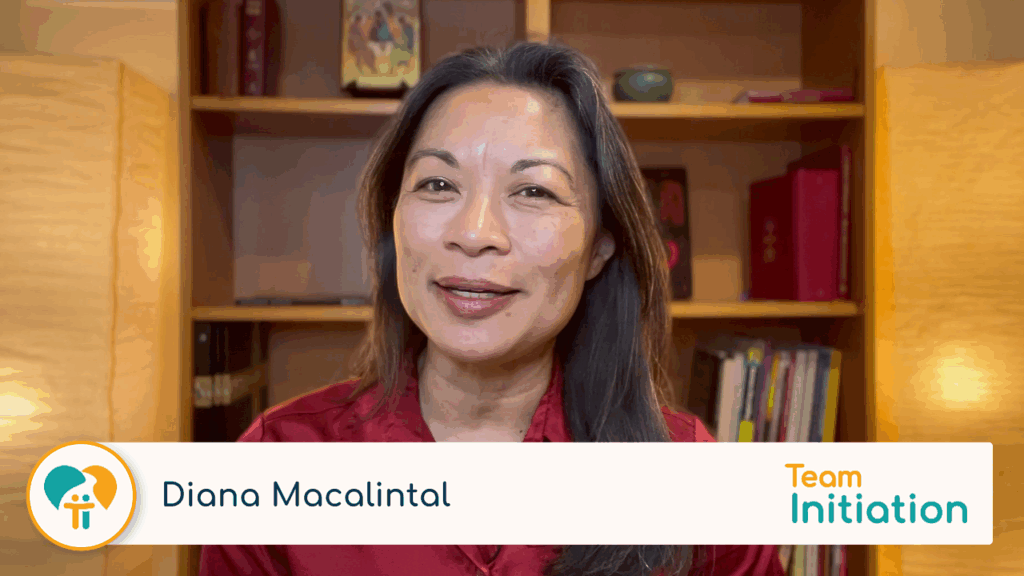 Last Saturday, Diana and I met with about 100 RCIA leaders from the Archdiocese of Melbourne, Australia. The topic we were asked to address is how to use the new tools of social media to assist in the catechumenate process.
Last Saturday, Diana and I met with about 100 RCIA leaders from the Archdiocese of Melbourne, Australia. The topic we were asked to address is how to use the new tools of social media to assist in the catechumenate process.
That’s not an easy topic. For those of us who did not grow up with digital media, everything computer and Internet related seems to be better, faster, and often incomprehensible gadgets. The computer is a better typewriter or the smart phone is an improvement over the heavy black dial telephones that were connected to a wire that disappeared inside the house wall.
But the digital world is not just about new tools. It is a new culture. It is a culture with its own language, conventions, rituals, and stories. If we are going to evangelize and catechize with the tools of social media, we have to first learn the language and the culture of the digital world.
When we said this to the folks in Melbourne, we then suggested to them that they immerse themselves in this new culture, just as we would if we were sent as missionaries to a foreign land.
Bishop Paul Tighe, secretary of the Pontifical Council for Culture, says there are four entry points we should explore if we want to establish a dialogue with those who grew up as digital natives. (Bishop Tighe’s ideas are drawn from a personal interview recounted in Connected Toward Communion by Daniella Zsupan-Jerome, p. 122).
Following
The first entry point we might make when we seek to enter the digital world is the practice of “following.” Digital natives are sometimes obsessed with the number of followers they have for their online presence. This can become an unhealthy obsession that objectifies the person at the other end of the “like” button. But conversely, following someone online can be an invitation to hospitality, receptivity, dialogue, and discipleship.
The concept of “following” is easily translatable for us who are digital “immigrants.” We can understand the idea of following from the perspective of RCIA 75.1, which tells us that catechumens must be trained in a Christian life that is centered on the word of God. By following God’s word, the catechumens will always know that they are following a true path that will lead them to the Promised Land.
Friendship
A cultural driver for the digital world is “friending.” A hallmark of Jesus’s ministry was his ability to friend others, especially those who were different and outcast. Recall the story of the Good Samaritan, which began with a scribe — a communications expert — asking Jesus, “Who is my neighbor?” (Lk 10:29). Today, he might have asked, “Who is my online friend?” Friending — creating networks of meaning and relationship — is a tradition we can easily adopt in the digital world.
For us digital immigrants, there is a resonance with the concept of online friending and participating in the real-life Christian community of our parishes. Paragraph 75.2 of the RCIA directs us to immerse the catechumens in the life of the Christian community. By doing so, they will discover the true meaning of Christian friendship.
Searching
The Internet in general and Google in particular exists to facilitate search. Digital natives browse, surf, research, and gather information almost incessantly. It is a small step for us to connect this need to search with the search for truth and the search for peace.
The premier place where we search for and discover the truth is in the liturgy. Paragraph 75.3 tells us that an essential element of the formation of the catechumens is that they learn how to pray and worship. Through this discipline, they will learn how to fruitfully search for and discover the peace that only Jesus can provide.
Sharing
Most digital natives believe in open-source. That is, everything is “in the cloud,” open and available to anyone. If I have a helpful snippet of code or the answer to a frustrating computer error, I upload it to a public server for the benefit of all. This is so clearly connected with the ethos of the community of disciples in Acts, who shared all things in common, that it should seem an easy practice to adopt for us digital immigrants. The ultimate goal of this culture of sharing is sharing ourselves, especially with those who are in need.
This entry point into the digital world is clearly echoed in RCIA 75.4, which says that even while they are still in formation, the catechumens must be out in the world witnessing to their faith and engaging in acts of mercy. This is the reason we have an initiation process — to make disciples who will bring good news to the whole world.
That is what we shared with the folks in Melbourne. What they shared with us was their enthusiasm and their commitment to this important ministry. It was exciting and uplifting to see the powerful witness of these 100 leaders who are so dedicated to spreading the gospel. It was a holy moment, and we feel blessed and grateful to have been a part of it.
Share your thoughts
How do you use social media to spread the gospel? What is a moment of holiness you have experienced?


















My name is Anton and I attended your presentation in Melbourne.
One point that intrigued me was the word “Community”
I felt that our RCIA team did not do “Community” well. Yes our timetable included guest speakers from some of our various parish activities. However your presentation made me think further and I will recommend to our team that we physically arrange and take the candidates one at a time to the parish activites such as:
– parish council meeting
– the local Vincent de Paul meeting
– the travelling home rosary
to mention a few.
Would be pleased to have your thoughts.
Kind regards
Anton
Like Anton, I also attended the RCIA Day in Melbourne, to my great benefit.
And like him, the No 1 learning for me was the importance of getting the Parish community involved in RCIA (and the Catechumens/Candidates involved with the Parish).
One of the suggestions that really appealed to me was arranging for each of the Catechumens/Candidates to be invited home once a month for a meal with a Parish family. This is easy to organise and is following Jesus’ example (didn’t he spend half his life at meals and banquets, and the other half talking about them in parables!)
Sorry, this comment has little to do with digital media – I blame Anton for the diversion!!
Thank you Diana and Nick for sharing your talents and enthusiasm with us last weekend.
Tim Hamilton
Thanks for this ‘New Tools for RCIA’; I appreciated how you coupled the example with the ‘Rite number’.
My only encounter with social media is ‘facebook’ and ‘pinterest’ (sometimes) and these avenues I use to share articles that speak to my heart.
Moments of holiness – I have recently connected to the Ignatian Spirituality – dotMagis – and this has opened an avenue that reminds me throughout the day to be aware of God’s presence and to practice the Examen at night.
We have been searching for a way to pass on the information that catechumens and candidates seek; information that can get in the way of the formation process to which we dovote our time together. Last year we tried a forum board with mixed results. This year we may try a “closed” Face Book site. Another option is a blog. All three can be used to pass on information and for participants to share their thoughts and questions.
I am 80 years old and just learned to text. I agree that social media is the way to reach and retain our 30 and under aged people. We need to remind everyone that God loves Us and that every experience he gives and every person he puts in our lives is perfect preparation for a future only he can see. We should all try to leave our comfort zones. May God bless us all and keep us in the palm of his hand.